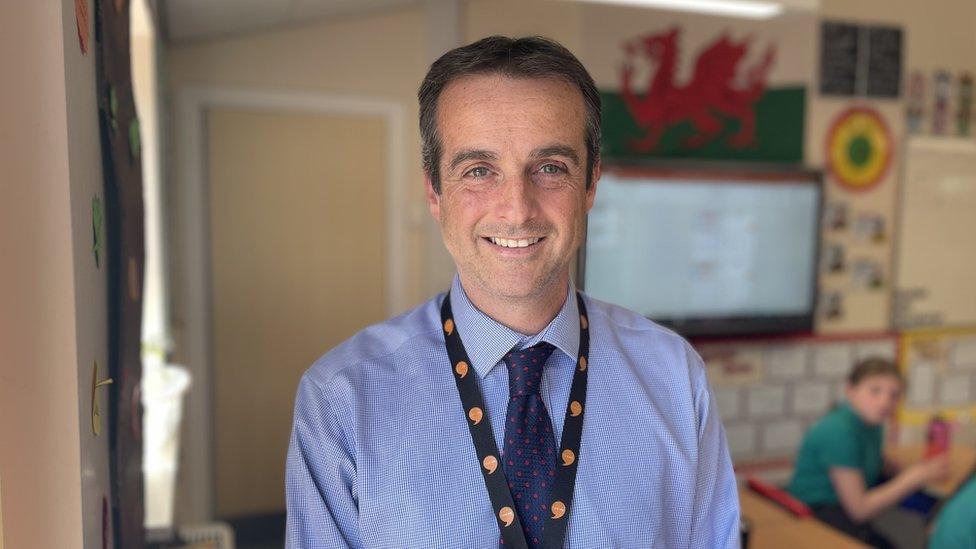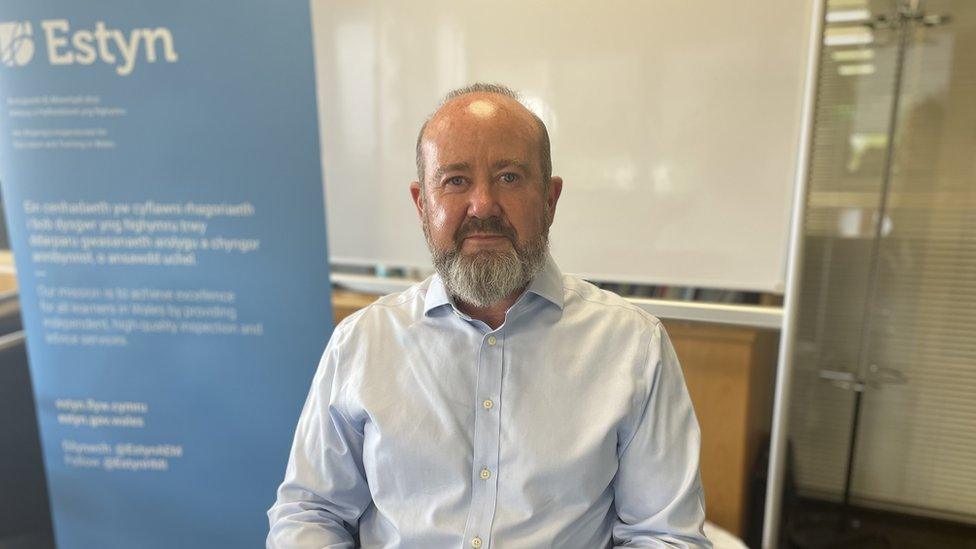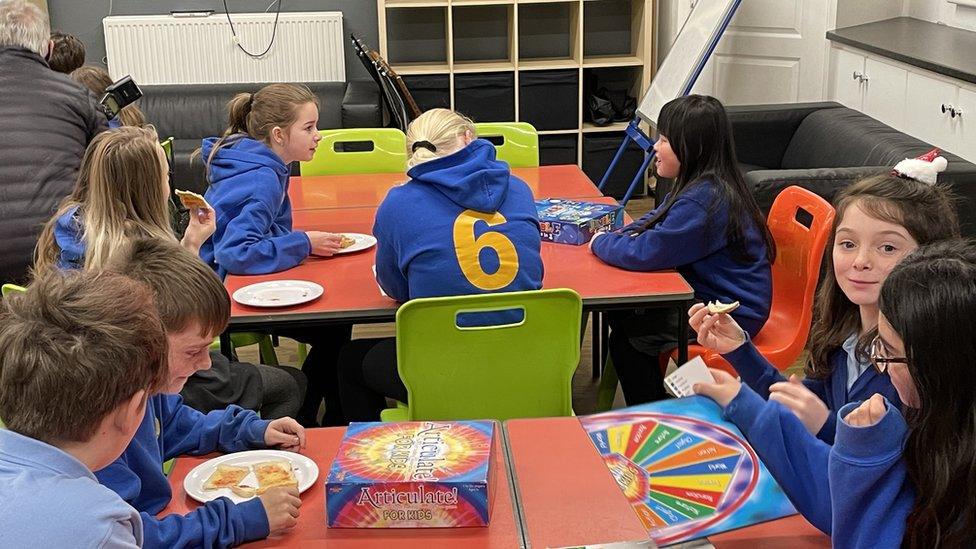Wales schools: New lessons 'exciting but a challenge'
- Published

There are concerns the new curriculum will exacerbate the effects of the pandemic on pupils' learning
Changes to how and what children in Wales learn are "fresh and exciting" but a challenge for schools, teachers have warned.
All Welsh primary schools and about half of secondary schools will start introducing a new curriculum next term.
But there are fears many still live with the legacy of the Covid pandemic.
Wales' chief inspector of education has accepted that not all schools will be ready to introduce the new curriculum in September.
"I think everyone that works in schools would agree that this change with the new curriculum is to be welcomed," said one north Wales primary headteacher, Osian Jones.
"It's something fresh, something new, and something exciting."

New lessons are welcomed but also pose a challenge for schools, says primary headteacher Osian Jones
But Mr Jones, who is in charge of Plas Coch and Bro Alun schools in Wrexham, said it also brought enormous challenges to classrooms.
"Our priorities over the last two terms, since the start of this educational year, has been to keep the learners safe," said the head.
"Because of the challenges presented by Covid, staffing levels have been low. It is still a challenge to get supply staff are off ill.
"The time needed for strategic thinking has been very limited."
He said introducing the new curriculum may prove "difficult in the first few months," though will be a success in the longer term.
After years of preparation, primary schools will be legally required to introduce the new curriculum for Wales from September.
Secondary schools were given the option of introducing it for pupils starting Year Seven in September 2022 - as originally planned - or delaying until September 2023 due to the impact of the pandemic.

Estyn head Owen Evans says the picture is mixed on rolling out the reforms
Owen Evans, the head of the schools watchdog Estyn, said some schools' work on the new lessons was "exceptional" but others needed support to catch up.
Primary schools were more ready because of the way they work, while it was more of a change for secondary schools, Mr Evans said.
Acknowledging the pandemic had "definitely set things back" and placed a "huge strain", he said the best schools had still managed to think about and experiment with the curriculum.
But he said while the picture was positive overall, it has been mixed.
'Embraced the journey'
"We've seen some schools that have absolutely run with the curriculum and are doing some quite exceptional stuff, but we're seeing other schools that are further behind in their planning," he said.
"I think that to a degree is to be expected, but the key now is to make sure that all schools are supported to catch up."
Staff at Llandeilo Primary in Carmarthenshire are ready for September and have "embraced the journey we are on", according to Vicki Davies, its lead on implementing the new curriculum.
"We started our journey many years ago really, back five or six years ago, when we noticed our children transitioning up to years three and four from the foundation phase were finding it quite difficult," she told BBC Radio Wales Breakfast.
"So we started making changes then that were really in line with the new curriculum."

Staff at Llandeilo Primary feel better prepared for the new curriculum
While she said the pandemic has not helped many schools, the information has been available for a long time, and it is about "taking the initiative and doing things yourself".
She added: "As long as you have it as a consistent journey with your teachers, taking them along with you and having plenty of information to support it."
The Welsh government said an "enormous amount" had been achieved.
Education minister Jeremy Miles said the new curriculum was "a once in a generation reform" and was delighted by the "enthusiasm, motivation and support for the new curriculum and the real and impressive innovation happening across Wales".

What is the new curriculum for Wales?
The blueprint for the curriculum was first published in 2015 and it has been dubbed the biggest change to Welsh education in a generation.
It is based on six areas of learning and experience, rather than narrow subjects - with the aim of helping children and young people reach four goals - to become ambitious, capable learners; enterprising and creative contributors to society; ethical, informed citizens; and healthy and confident individuals.
While the Curriculum for Wales sets a framework, schools are encouraged to develop their own curricula tailored for their pupils and communities.
But some are worried it does not provide enough structure for teachers and could lead to too much variation in standards.

The curriculum will eventually cover all three to 16-year olds and is due to be rolled out year by year, reaching Year 11 in 2026.

The new curriculum is also being rolled out to secondary school in Wales
The Welsh government has confirmed fewer than half of secondary schools have decided to introduce the curriculum this September.
Ysgol y Creuddyn, near Llandudno, Conwy county, is one of the schools that has chosen to delay until September 2023.
Head teacher Trefor Jones said the new curriculum was "an unique opportunity" and he wanted to give staff "the time and space" to get it right.
Allowing extra time for parents, pupils and the community to feed into the process would be "really beneficial", he said.
"What we're looking for is that ability to spend a bit of time to reflect on what we've got in place and ensure that we learn those lessons to ensure that curriculum is as good as it can be and as exciting as it can be moving forward."
Head teachers' representatives said they supported the curriculum but were worried about the "distraction" of other reforms.
The workload could be "setting the profession up to fail and have a detrimental impact of the health and wellbeing of staff and learners alike", President of the National Association of Head Teachers (NAHT) Cymru Kerina Hanson said.
Eithne Hughes, Director of the Association of School and College Leaders (ASCL) Cymru called the curriculum "a social movement" and described it as "huge".
But she warned "we should not be looking at a raft of other reforms, for example discussions around changing the school day and year, at the same time".
Another union warned a mixed picture will mean "children in Wales having rather different educational experiences" and some might experience "no change at all".
"There is still widespread concern about the timetable and speed at which the reforms are being rolled out," Neil Butler, NASUWT Cymru national official said.
"Schools are still grappling with the effects of the pandemic on children's learning and development and there is concern that the addition of the new curriculum on top will exacerbate, rather than help, the challenges schools are dealing with."
A Welsh government spokesperson said they "appreciate the challenges the whole of education has faced during the pandemic" and that's why secondary schools had been given flexibility.
An extra £35m had been provided this year to support the roll-out of the curriculum, it said.

HAYLEY PEARCE PODCAST: Tackling the issues that make the group chats go off
IN MY SKIN: A bittersweet story with Welsh wit and grit

- Published24 October 2021

- Published6 July 2021

- Published9 December 2021
